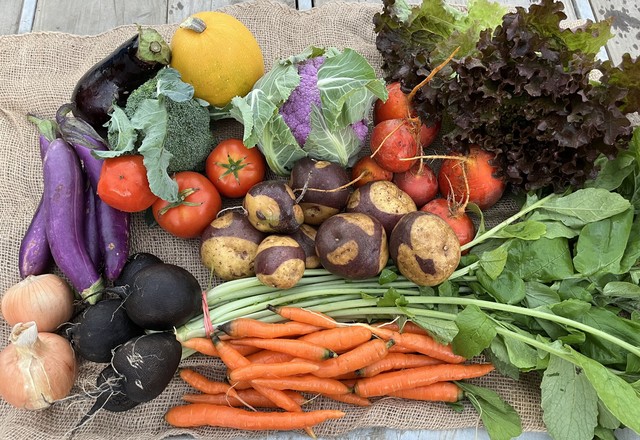- Gold Beets
- Carrots
- Head Lettuce
- Yellow Onions
- Painted Purple Potatoes
- Spaghetti Squash
- Black Winter Radishes
- Eggplant
- Tomatoes
On Rotation:
- Broccoli
- Cauliflower
- Romanesco
All kinds of new things showing up in the totes these days: purple cauliflower, black radishes, spaghetti squash, painted purple potatoes, and gold beets (so sweet!)!!
The black winter radishes, aka "black Spanish radish," look like a bunch of charcoal briquettes topped with pretty green leaves. They have the skin of a rhino and some serious kick. I saw a little piece online about black radishes, entitled: "Ode to a Difficult Food" and thought, "eep, time to do some CSA hand-holding this week....," especially when I got to the part where the author writes:
Thanks to heirloom seeds and small farms, I’ve enjoyed many types of radishes in the last few years, realizing that they vary so greatly from the crisp, magenta balls that recall fishing bobbers. These include the striking watermelon radish, dense and spicy Chinese green radish, elegant French breakfast radish, finger-shaped purple and white radishes, and smaller varieties of daikon radish with mint-greenish shading at the top of the root... None put up more barriers to being loved than the coarse-surfaced, rotund black radish. These stringently bitter bulbs are coated in a thick skin that resembles a rhinocerous. Their dense, fibrous flesh has a fierce lick of horseradish. Why the hell did anyone cultivate this, when the cheery sparkler radish was just as easy to grow?
The author goes on to answer their own question, historically, by explaining that black radishes were great survival food in Medieval times in Europe because they store well through the winter and can squat outside in the ground through the harshest freezing weather, thanks to "their thick, tar-like mask of skin [that] protects the icicle-white flesh like armor built for function over fashion."
So WHY are we growing them at Valley Flora, circa 2023? I'm not sure I have a great answer to that question, other than: they looked cool in the seed catalogue? Which is also another way of saying "diversity! diversity! diversity!" Also: sorry?
Given that they might too easily fall into the "difficult" category among all your CSA foods, and thereby land too easily in the compost pile, here are the previously quoted author's top three recommendations for getting them down your gullet:
1. Chopped and roasted with olive oil, sea salt and chili flakes
I don’t know too many root vegetables that don’t taste great like this, and the crisped peaks of the wedges are delightful contrast to the softer, mellowed flesh inside. I preheated the oven to 400 degrees, then peeled and chopped the root to equal-sized pieces. Coated lightly with olive oil, sea salt, and flakes of chili, they were roasted about 20 minutes, with one break to toss them around in the pan in between.
2. Shredded raw with apples, carrots, lemon and mint
Black radishes are a bit spicier and tougher than most types, but combined with the sweetness of carrots and tartness of fresh apples, they’re a pleasant complement. I used lots of fresh lemon juice and let it soak in for a while, along with good olive oil, and finished it with a few mint sprigs for extra refreshment.
3. Roasted in skins, peeled, and mashed with butter
A spin on Mike’s suggestion, with simply butter, salt and pepper. This could lend a hint of flavor if blended with mashed potatoes, or it could be the start of a creamy radish soup if simmered with stock. To concentrate its flavor more, I roasted the radishes in their skins, sliced in half flesh side-down on a pan (like I would a winter squash). After a good 40 minutes or so, the flesh shrinks back and allows the skin to be easily peeled off the bulb once cool (like with beets).
Pickling will also beat them into submission.
I could be convinced not to grow them again, but they just look so weird and spooky...kinda perfect around Halloween.
Oh! That's it! You can hand them out as trick-or-treat "candy!" As mentioned, they'll store in your fridge well into 2024, so no problem keeping them until October 31st!

